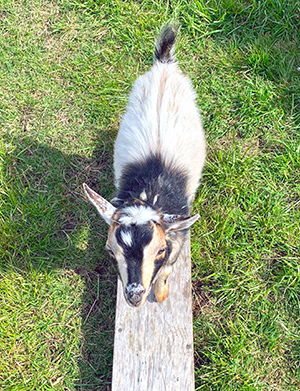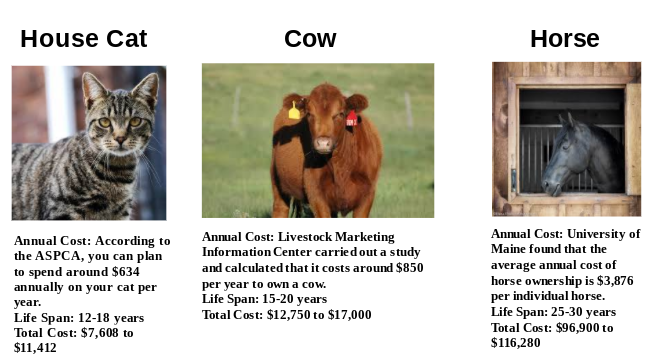What miniature goats can teach us about being a responsible animal caretaker
Posted May 13, 2022 at 2:46 pm by San Juan Update

Contributed photo
Friday Harbor High School junior Audrey Allen shares insights about the community project at Island Haven Animal Sanctuary that she recently completed with fellow junior Eleanor Rollins.
I started my research on farm animals when my community project at Friday Harbor High School started. My colleague Eleanor and I wanted to work with Island Haven Animal Sanctuary here on the island.
Island Haven takes in farm animals who need homes. This most often happens when the people who had the animal previously could no longer take care of it, when the animal is no longer wanted due to illness or age, or when the animal’s environment is no longer safe. Island Haven takes in these animals and takes care of them to fit their individual needs.
Like most animals, goats need to be able to play and run around. For young miniature goats, it is especially important for them to have different activities. To help satisfy this need, Eleanor and I decided to build Island Haven’s miniature goats a miniature playground in order to give them a fun toy and new stimuli. We ended up making a teeter-totter, a balance beam, and added some wood rounds for the goats to jump around on as part of our playground. We researched what types of non-harmful woods we should use and figured out what goats most like to play with. We were fortunate to find a few generous people who donated wood and supplies to us and helped us reach our goals.
But it’s important to consider the reasons why the goats ended up at Island Haven at all.
Having farm animals can be really exciting and enriching for both adults and children. You learn many good skills and there is such a big reward. Many animals can make great pets. But one key factor when deciding whether or not to own an animal is understanding what that pet needs. Owning a cat is much different than owning a horse, for example. That is why it is so important to know what you are getting into, make sure you have the space, and be certain you have the budget to take on the responsibilities of owning farm animals.
Not understanding an animal’s needs is one of the main reasons why owning farm animals doesn’t always work out. The cost of owning a farm animal can be a lot more than you would expect. For example, a cow just eats grass, and one might expect to not need to feed a cow because of this. But the annual cost of owning a cow is approximately $850 dollars per year when considering expenses like additional feed, medications, and veterinary care. Cows typically live between 15 and 20 years old, which means the total cost of owning a cow for its full life span can cost as much as $17,000.
Before bringing home a farm animal, consider asking for a test trial from the company you are buying the animal from. Ask to have the animal on your property for two to four weeks so that you can see what it is like to take care of the animal and adjust your schedule to their needs. Taking this test period can also help with identifying any diseases the animal may have and figuring out if those diseases can be addressed or not before purchasing the animal.
It’s also recommended to do your own research. Go onto the internet, or talk to other farmers who own similar animals and find out about their experiences. You should also learn details about the animal’s basic needs and try to get an idea of both the annual and full-life costs of taking care of the animal.
If you decide a farm animal is right for you, make sure to maintain their enclosures — check fences weekly, make sure the enclosures are safe, and check for broken gates or structures. If you do rotational feeding, you also need to make sure you are following your schedule for 180 days, and no earlier, otherwise the manure does not have time to decompose the diseases inside.
If you have other questions about animal care, please reach out to Island Haven Animal Sanctuary.

You can support the San Juan Update by doing business with our loyal advertisers, and by making a one-time contribution or a recurring donation.
Categories: Around Here
One comment:










One comment...
Very interesting! Thanks!
By submitting a comment you grant the San Juan Update a perpetual license to reproduce your words and name/web site in attribution. Inappropriate, irrelevant and contentious comments may not be published at an admin's discretion. Your email is used for verification purposes only, it will never be shared.